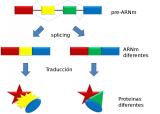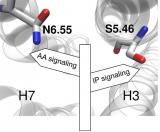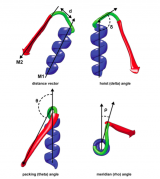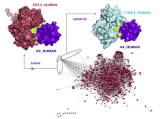
04/03/2015
Biomedical Big Data
This post belongs to a invited post collection of the Mind the Byte's blog and has been written by Prof. Ferran Sanz, Professor of Biostatistics and Biomedical Informatics at the Universitat Pompeu Fabra (UPF), Barcelona. You can read the original following this link.

04/03/2015
VIII Conferencia Anual de las Plataformas de Investigación Biomédica
Los próximos días 24 y 25 de marzo, se celebrará en Madrid, la VIII Conferencia Anual de las Plataformas de Investigación Médica: Medicamentos Innovadores, Nanomedicina, Tecnología Sanitaria y Mercados Biotecnológicos: La necesidad de la innovación, en la que se darán cita más de cincuenta ponentes nacionales e internacionales, se pondrá de manifiesto el alto nivel científico de la investigación biomédica en España con la participación en importantes consorcios público-privados a nivel internacional.
Inscripciones en www.medicamentos-innovadores.org.

23/02/2015
BACFITERed: Red de Excelencia para la Explotación de Bacterias con Fines Terapéuticos
Hoy comienza en Madrid la reunión inaugural de BACFITERed, una nueva Red de Excelencia que tiene por objetivo el diseño de probióticos y terapias antibacterianas y anticancerígenas. En la Red participan 10 grupos de investigación españoles expertos en una amplia variedad de estrategias para la utilización de bacterias con fines terapéuticos, entre ellos el grupo de Farmacología de Sistemas del GRIB (IMIM-UPF) dirigido por Jordi Mestres que participará aportando una nueva metodología en biología sintética para la predicción de metabolomas, es decir, para la predicción del conjunto de moléculas denominadas metabolitos que intervienen en las reacciones bioquímicas i procesos físico-químicos que se producen en una célula.

Project iPIE: Testing the environmental impact of drugs
The project iPIE: Intelligence Led Assessment of Pharmaceuticals in the Environment starts on February 2015 with a kick off meeting at Barcelona Biomedical Research Park (PRBB) and the participation of the GRIB research groups of Integrative Biomedical Informatics (IBI) and PharmacoInformatics (PhI).
It is often ignored that any drug administered to human patients ends up in the environment, either in the original form or as a mixture of drug metabolites. Testing the environmental impact of novel drug candidates is therefore important in order to early discard potentially dangerous ones.
With a budget of 10.2 million euros and a duration of 4 years, the project iPIE aims to develop a predictive framework that utilise existing information and in silico models to support more intelligent environmental testing of pharmaceuticals in development and to prioritise legacy pharmaceuticals for full environmental risk assessment and/or environmental (bio) monitoring.

19/02/2015
The promiscuity of chemical probes discovered
A new computer tool developed by researchers of the Systems Pharmacology group of GRIB (IMIM-UPF) led by Jordi Mestres, lets the interaction between small molecules and thousands of proteins be predicted to study their relationship to different diseases. The study, published in the prestigious journal ACS Chemical Biology and chosen to be on the cover has proven that many of these small molecules or chemical probes are not as selective as believed, but instead interact with multiple proteins, which could lead to confusion in experimental results. Understanding these interactions is key to developing more efficient and safer pharmaceuticals.
Art. Reference: Antolín A, Mestres J. Distant Polypharmacology among MLP Chemical Probes. ACS Chem Biol. DOI: 10.1021/cb500393m

20/01/2015
A new and efficient method discovers switches predictive of cancer
A new publication of the Computational Genomics group of GRIB (IMIM-UPF) led by Eduardo Eyras, has been published in the journal Nucleic Acids Research and explains the results of applying a new computational method to project data from the Cancer Genome Atlas (TCGA) branch funded by the National Institutes of Health (NIH) US project ICGC (International Cancer Genome Consortium). This work represents the first large-scale analysis published, describing alterations in splicing of new cancers using RNA sequencing data from more than 4000 samples.
In this work, they discovered that there exist many splicing switches in patients with the same cancer type and showed that these switches separate with high accuracy tumor and normal samples, and different types of cancer from each other, providing a predictive signature for the disease.
click here to read the full article
Ref. publ.: Sebestyen E, Zawisza M, Eyras E. Detection of recurrent alternative splicing switches in tumor samples reveals novel signatures of cancer", Nucleic Acids Research, 2015; doi: 10.1093 / NAR / gku1392.

9/2/2015
Thesis defence of María Martí: “Ligand selectivity at GPCRS: from multi-target binding profiles to biased agonism”
On 10rd of February, María Martí, member of the PharmacoInformatics group of GRIB (IMIM-UPF) will defend her thesis at 11:00 at Josep Marull Room (QMAR building). You are all invited to this event.

26/01/2015
Thesis defence of Jaume Bonet: "Exploiting protein fragments in protein modelling and function prediction"
On 30rd of January, Jaume Bonet, member of the Structural Bioinformatics group of GRIB (IMIM-UPF) will defend his thesis at 11:00 at Josep Marull Room (QMAR building). You are all invited to this event.

16/01/2015
Algorithm identifies networks of genetic changes across cancers
The application of a novel computational algorithm called HotNet2 to a pan-cancer cohort comprising somatic alterations from 12 tumor types has resulted in the detection of combinations of rare somatic mutations that contribute to tumorigenesis. The novelty of the algorithm consists in the analysis of somatic alterations across genes taking into account the interactions of their products in the development of biological functions, rather than individual genes. By pooling together alterations affecting interacting genes, the statistical power to detect driver element modules increases. Furthermore, it is possible to gain new insights into the biological processes involved in tumorigenesis. This is an essential step to develop therapeutic strategies to fight tumors.
Researchers of the Biomedical Informatics group of GRIB (IMIM-UPF) led by Nuria Lopez-Bigas has participated on this work published in Nature Genetics. The study was a team effort from an array of research groups, led by Benjamin Raphael (Director of the Center for Computational Molecular Biology at Brown University, USA).
More details of this work and interview to Dr. Raphael at science daily website.

Thesis defence of Javier García: "Protein-protein interaction network: management of databases and its applications on the computational study of protein-protein interactions”
Today 23rd of January, Javier García, member of the Structural Bioinformatics group of GRIB (IMIM-UPF) will defend his thesis at 11:00 at Sala Ramon y Cajal – Campus Mar (PRBB). You are all invited to this event.



